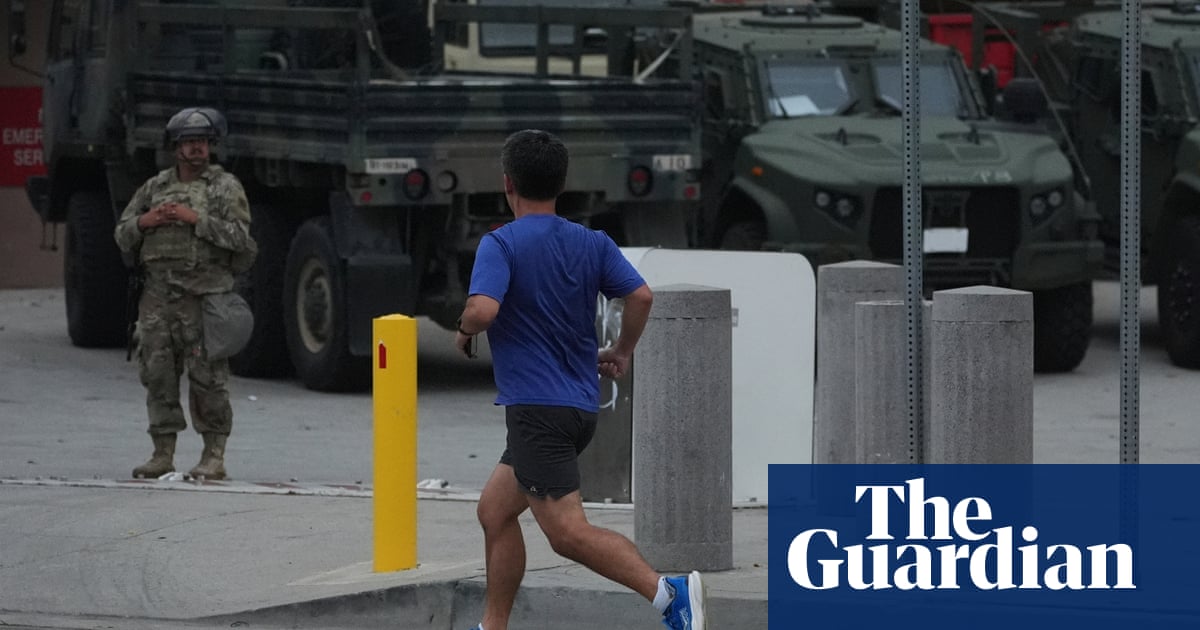Los Angeleson Tuesday was bracing for new troop arrivals after a quieter night following four days ofprotestsover federal immigration raids on local businesses.
The initial deployment of 300 national guard troops is expected to quickly expand to the full 4,000 that has been authorized byDonald Trump, with an additional 700 marines who could begin arriving on Tuesday.
The US Northern Command, or Northcom,said in a statementon Monday that marines from the 2nd Battalion, 7th Marines, 1st Marine Division “will seamlessly integrate” with forces “who are protecting federal personnel and federal property in the greater Los Angeles area”.
Northcom added that the forces had been trained in de-escalation, crowd control and standing rules for the use of force – and that approximately 1,700 soldiers from the 79th Infantry Brigade Combat Team, a California national guard unit, were already in the greaterLos Angelesarea.
The national guard and marine detachments were being dispatched to the US’s second largest city over the objections of California’s governor, Gavin Newsom. And the state is now suing theTrump administration, claiming the president illegally federalized the national guard to confront protesters in Los Angeles.
California’s attorney general, Rob Bonta, said on Monday that the state’s sovereignty was “trampled”. But Trump countered that his administration had “no choice” but to send in troops. The national guard are not believed to be involved in crowd control but assigned to protect federal property.
“If I didn’t ‘SEND IN THE TROOPS’ to Los Angeles the last three nights, that once beautiful and great city would be burning to the ground right now, much like 25,000 houses burned to the ground in L.A. do to an incompetent Governor and Mayor” Trump said in a Truth Social post early on Tuesday, referring to the response to wildfires that devastated parts of Los Angeles county late last year. Trump later deleted that post andpublished anotherwith the correct spelling of “due”.
But the deployment is strongly opposed by California Democrats. Senator Alex Padilla told the Associated Press on Tuesday that protests against the US’s Immigration and Customs Enforcement (Ice) as well as the subsequent legal showdown between his state and the government “is absolutely a crisis of Trump’s own making”.
“There are a lot of people who are passionate about speaking up for fundamental rights and respecting due process, but the deployment of national guard only serves to escalate tensions and the situation,” Padilla said. “It’s exactly what Donald Trump wanted to do.”
Padilla slammed the deployment as “counterproductive” and said the Los Angeles sheriff’s department had not been advised of the federalization of the national guard. He said his office had pressed the Pentagon for a justification, and “as far as we’re told, the Department of Defense isn’t sure what the mission is here”.
“Los Angeles is no stranger to demonstrations and protests and rallies and marches,” Padilla added. “Local law enforcement knows how to handle this and has a rapport with the community and community leaders to be able to allow for that.”
The defense secretary, Pete Hegseth, signaled support on his personal X account for deploying troops to California.
“Due to increased threats to federal law enforcement officers and federal buildings, approximately 700 active-duty US Marines from Camp Pendleton are being deployed to Los Angeles to restore order,”he posted on X.“We have an obligation to defend federal law enforcement officers – even if Gavin Newsom will not.”
Hegseth will testify on Tuesday along with the joint chiefs of staff chair, Gen Dan Caine, before the House appropriations subcommittee on defense. The meeting is focused on the nearly $1tn budget request for 2026, but Democrats are likely to question the defence secretary on the controversial move to deploy national guard and marines to LA.
